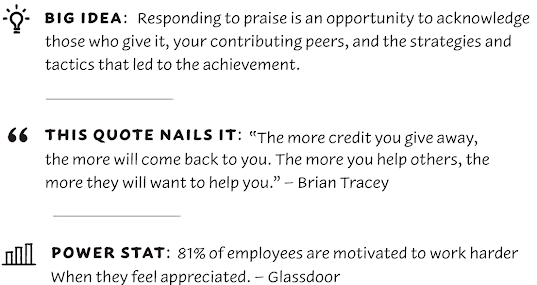When you are short of time, here is the one action that will give you 80 percent results in 20 percent of the time.
DO THIS
Share the recognition with fellow contributors.
BY DOING THIS
– Thank the giver of the praise.
– Identify those who contributed.
– Specify the roles they played.
Change
initiatives can be gruelling and can feel like a succession of uphill battles
characterized by tight deadlines, difficult challenges, stretched capabilities,
and long hours. Giving and receiving recognition energizes individuals and
teams and builds momentum to tackle the next tasks and activities.
Acknowledgement
for your hard work feels great. It’s tempting to accept it by saying, “Thank
you, I have been working hard." The best response is to share praise with
those who contributed to the success and detail how they contributed, which
maximizes the distinction. Saying, “Thank you, we all worked hard to hit this
deadline, and Tim and Sandeep created a focused plan to get us there,” broadens
the recognition and signals that you are a humble leader. People will notice
your thoughtfulness.
Round
off your acceptance by connecting the team’s capabilities with future
achievements. By saying something like, “We’re on a roll,” or “We’re ready for
the next challenge,” you encourage the behaviours that got the results and
create the momentum for success to become a habit.
KNOWLEDGE BITES
Keep a list of acknowledgements to motivate yourself and the team in challenging times and to create a project summary at the project’s end.
For more stories, insights and advice, listen to the Responding to Praise podcast episode with communication and corporate affairs leader Saira Absar.
Phil Buckley is the author of Change on the Run and Change with Confidence, host of the Change on the Run Podcast, and co-creator of the Sharing Change with Confidence Newsletter.
#change #changemanagement #businesstransformation #leadership #projectmanagement #praise #recognition #podcasts





